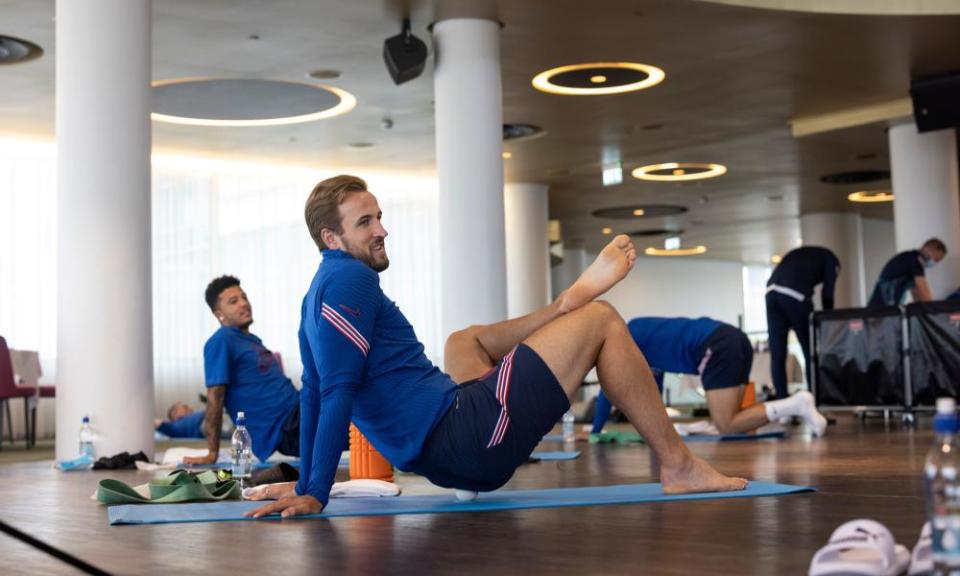England's weary travellers face battle to be in fit state for Denmark

Consider for a moment how Harry Kane was able to prepare for Saturday’s Nations League tie with Iceland in Reykjavik. The England captain had been on holiday with his family in the Bahamas when the island was added to the United Kingdom’s quarantine list on 7 August.
Kane had 24 hours to get back in order to avoid the mandatory 14 days in isolation and he said that it was not possible. “It’s not the easiest place to get back from, there’s no direct flights,” Kane said. “So I stayed there for another week and then had to quarantine when I got back.” Could Kane have done more to return straight away or, at least, earlier than he did? Was a private jet an option? It is hard to say. But what it meant was that Kane was in quarantine pretty much up to the moment he reported for England duty last Monday. The England captain worked out at his gym at home but, before the 1-0 victory over Iceland, he had trained only a few times as part of a squad.
Related: Gareth Southgate admits England 'got out of jail' against Iceland
It was a long way from being ideal for him or the England manager, Gareth Southgate, and Kane’s situation was far from unique. Raheem Sterling, for example, said on Saturday night that he considered the game to have been his third training session of the week – and he had done nothing before that, given he was still playing in the Champions League with Manchester City on 15 August.
Sterling’s lack of a meaningful summer break had a short-term upside; his fitness for Iceland was good and he was able to drive the team in the later stages. He scored what proved to be the winning goal with a 90th-minute penalty that he won himself.
Southgate had noted that his fittest players were those who had been involved with their clubs in last month’s Champions League and Europa League finals tournaments, namely Sterling, Kyle Walker, Phil Foden, Kieran Trippier and Mason Greenwood. The worry with these players concerns whether they will hit the wall at some point further down the line.
Kane was sharp in the opening 20 minutes in Reykjavik and he was denied what would have been his 11th goal in seven England appearances by an incorrect offside decision. But he faded badly, if understandably, to the point where Southgate felt he did not have the legs in the closing stages – when England were playing with 10 men after Walker’s red card. He replaced him in the 78th minute, introducing Manchester United’s Greenwood in his place for a debut.
England were tasked with unpicking Iceland’s tightly drilled system, which allowed for precious little space between the lines and no counterattacks, and Southgate made an interesting point when he said that quality and incision in the final third was the “last part to come” after a lay-off.
But on Tuesday night, Southgate and England will have to do it all again – against Denmark in Copenhagen.
Will Kane start? Can he start? On one level, it is ridiculous to ask the question but on the other, this is Kane and, when fit, he starts. Frankly, even when he is not fully fit, he starts. Regular Kane watchers have lost count of the number of times when it appears as if it will be too much for him to power through a particular game only for him to do so.
The Kane issue is delicate, not least as the new Premier League season starts this coming weekend, and it is mirrored by similar teasers in virtually every position. Southgate insists he is not under pressure from the clubs to rest particular players but, even when he thinks about the selection purely on his terms, he faces a difficult balancing act. Changes feel inevitable.
“The most important thing will be to really assess who can start, what gives us the freshness but keeps enough experience,” Southgate said when asked specifically if he could name Kane in the XI. “Energy will be key. It was impossible to expect the players to be at their best against Iceland, given not only the time since their last competitive games but also the shortage of training minutes.
“The clubs have been really understanding. Everybody knows this whole season is unique and they know that whenever we can we try to manage their players as well as we possibly can. We also have an important season – we can’t just focus everything on one game.
We felt we wanted to be strong against Iceland in the lineup we put out and now we have just got to assess that for Tuesday and pick what we can to get the result.” Southgate’s other main consideration in Copenhagen will be the formation, as it is understood he wants to trial a 3-4-3 lineup in order to develop more options and greater flexibility.
“It is a bit of a ‘needs must’ [because of player fitness and availability] but it is healthy in terms of the way we want to play,” Southgate said. “We can’t just be rigid. We don’t want to just stick to one way of playing if we are knocking on the door and not getting the number of shots on goal we want as happened against Iceland.”

 Yahoo Sport
Yahoo Sport 





































